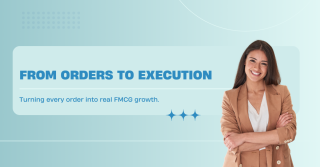Sales Forecasting In FMCG Balancing The Art And Science
_1736419413.png)
Sales forecasting is one of the most critical components of business success in the fast-moving consumer goods (FMCG) sector. FMCG companies operate in a dynamic, highly competitive environment where even small forecasting errors can lead to stockouts, excess inventory, or missed revenue opportunities.
Sales forecasting, at its core, is about predicting future sales using a blend of historical data, market trends, and strategic insights. But in FMCG, where consumer preferences can shift rapidly, accurate forecasting requires more than just numbers—it requires an artful understanding of market dynamics and a scientific approach to data analysis.
In this blog, we’ll explore the nuances of sales forecasting in FMCG, its significance, the methodologies involved, and how tools like Delta Sales App can enhance forecasting accuracy.
Sales Forecasting in FMCG: Balancing the Art and Science
Sales forecasting in FMCG isn’t just a number-crunching exercise; it’s an intricate blend of creativity and analytics. While historical data plays a crucial role, understanding market trends, consumer behavior, and competitive dynamics adds depth to the predictions.
On the artistic side, intuition based on experience can guide teams when numbers alone fail to tell the whole story. By harmonizing these elements, businesses can create more reliable forecasts that empower strategic decision-making and drive growth in an unpredictable market.
Sales forecasting in the fast-moving consumer goods (FMCG) sector is a delicate dance between intuition and data. In a world where consumer preferences shift overnight, striking the right balance becomes crucial for success. With field sales automation software at your fingertips, you can transform predictions from mere guesses into informed strategies that drive results.
Imagine having tools that not only streamline operations but also enhance decision-making. The key lies in understanding how to harness technology while still valuing the human touch of experienced sales teams. As we delve deeper into this topic, get ready to unlock new insights for achieving field sales success amid evolving market dynamics.
The Dual Approach: Art and Science in FMCG Forecasting
The Science: Data-Driven Forecasting
Data is the backbone of modern sales forecasting. Advanced tools and techniques allow FMCG businesses to analyze past sales data, market trends, and external factors to predict future demand.
Key Scientific Methods:
Time-Series Analysis
Uses historical sales data to identify patterns, such as seasonal trends.
Example: A beverage company might notice increased sales of soft drinks during summer and prepare accordingly.
Predictive Analytics
Employs machine learning models to incorporate multiple variables, such as market trends, weather conditions, and consumer behavior.
Example: A dairy company could forecast increased sales of ice cream during hot weather using predictive analytics.
Regression Analysis
Examines relationships between variables, such as price changes and sales volume.
Example: An FMCG company might use regression analysis to predict how a discount on a particular product will impact overall sales.
Market Research and External Data
Includes analyzing competitor actions, economic indicators, and market surveys.
Example: A snacks brand may adjust its forecast if a major competitor launches a new product in the same category.
Unlock Field Sales Success in a Changing World
In today’s rapidly evolving market, field sales teams face unprecedented challenges. Adapting to consumer behavior shifts and technological advancements is crucial for success. Embracing innovative strategies can make a significant difference.
By leveraging data-driven insights and advanced tools, sales professionals can enhance their effectiveness. Field sales automation software empowers teams to streamline processes, allowing them to focus on building relationships rather than getting bogged down in administrative tasks. This transformation leads to greater agility and responsiveness in an ever-changing landscape.
Why Sales Forecasting is Crucial in FMCG?
Inventory Management
Proper forecasting ensures optimal stock levels. Overestimating demand leads to overstocking, tying up capital and increasing storage costs, while underestimating demand can result in stockouts and lost sales.Supply Chain Efficiency
A reliable forecast helps align production schedules, supplier orders, and logistics, reducing costs and improving supply chain responsiveness.Profit Maximization
Accurate sales predictions allow businesses to allocate resources effectively, plan promotional activities, and seize market opportunities.Customer Satisfaction
Meeting customer demands consistently without delays enhances trust and loyalty, giving your brand a competitive edge.
Challenges in FMCG Sales Forecasting
The FMCG sector presents unique challenges when it comes to sales forecasting:
- Dynamic Consumer Behavior: Rapidly changing preferences can render forecasts unreliable.
- Market Competition: Competitor actions, such as price cuts or product launches, can disrupt demand patterns.
- Supply Chain Disruptions: Unexpected delays or shortages can impact product availability.
- Economic Fluctuations: Inflation, recessions, or policy changes can influence purchasing power.
The Art: Human Intuition and Market Expertise
While data is invaluable, the art of forecasting lies in interpreting that data within the context of the real world. FMCG companies must account for unpredictable factors such as:
- Sudden shifts in consumer preferences.
- Impact of viral trends or social media influences.
Example:
A leading confectionery brand predicted increased sales during a festival season based on historical data. However, a new viral health trend shifted consumer preferences toward sugar-free products. The company adjusted its forecast and prioritized its sugar-free range, achieving better-than-expected results.Transforming Field Sales to Achieve More
Transforming field sales requires a fresh perspective on how teams operate. Embracing technology, especially field sales automation software, can streamline processes and boost efficiency. This shift allows sales reps to focus more on building relationships rather than getting bogged down in administrative tasks.Empowered by real-time data, teams can make informed decisions that drive performance. Enhanced communication tools ensure alignment and collaboration while providing insights into customer needs. The result is not just increased productivity but also a stronger connection between the brand and its audience.
Steps to Create an Accurate Sales Forecast in FMCG
- Collect and Analyze Data
Gather historical sales data, market trends, and external factors like weather or economic indicators. Segment Your Market
Break down forecasts by product category, region, or retail channel for more granularity.Incorporate Seasonal Trends
Factor in recurring patterns, such as festive sales spikes or seasonal demand fluctuations.Collaborate Across Teams
Involve sales, marketing, and supply chain teams to align forecasts with market insights and operational capabilities.Leverage Technology
Use advanced tools like Delta Sales App to automate data collection, analysis, and reporting for real-time, accurate forecasting.Monitor and Adjust
Continuously track actual sales against forecasts and adjust predictions as necessary.B2B Sales Teams
B2B sales teams operate in a landscape defined by complexity and competition. They require precise strategies and robust tools to navigate long sales cycles, multiple stakeholders, and ever-evolving client needs. Field sales automation software empowers these teams by enhancing collaboration and streamlining processes.
With integrated analytics, B2B teams can generate meaningful forecasts that drive smarter decisions. This technology not only boosts efficiency but also fosters stronger relationships with clients, ultimately leading to increased trust and higher conversion rates.
Real leaders, Real Results
Real leaders in field sales understand that success is driven by data and human connection. They leverage insights from field sales automation software to make informed decisions, enhancing team performance.
These leaders inspire their teams through empowerment and trust. By fostering a culture of collaboration, they unlock potential and drive revenue growth. The results speak for themselves: increased productivity, higher morale, and ultimately, impressive bottom-line outcomes that redefine what’s possible in the world of FMCG sales.
What Is Field Sales Software?
Field sales software is a specialized tool designed to streamline the sales process for teams operating outside the office. It helps manage customer relationships, track leads, and monitor sales activities in real time. This technology empowers field representatives with essential data at their fingertips.
By automating routine tasks, such as reporting and scheduling, the software enables sales professionals to focus on building relationships and closing deals. With intuitive interfaces and mobile access, it enhances productivity while keeping everyone connected to the core business objectives.
When selecting field sales automation software, understanding the top options available is crucial. The best tools streamline processes and enhance communication for both B2B and B2C teams. Each software offers unique features tailored to different needs.
How to Choose the Right Field Sales Software for Your Business?
Choosing the right field sales software starts with understanding your team's specific needs. Identify key features that align with your objectives, such as real-time tracking or reporting capabilities. This ensures you invest in a solution that truly supports your sales strategy.
Next, consider user experience and integration capabilities. A well-designed interface encourages adoption among team members. Additionally, ensure the software can seamlessly integrate with existing tools for smoother workflows. Balancing these factors will lead to a more effective selection process tailored to your business goals.
How to Implement Field Sales Software in Your Business?
Implementing field sales software starts with identifying your team's specific needs. Evaluate existing workflows and pinpoint pain points that the software can address. Involve team members in the selection process to ensure buy-in and usability.
Once you’ve selected the right solution, roll it out gradually. Provide thorough training sessions to familiarize everyone with its features. Encourage feedback during this phase for adjustments and improvements. A smooth implementation sets a solid foundation for enhancing productivity and boosting sales performance across your organization.
Sales Force Automation App for your Field Employees
A sales force automation app is a game-changer for field employees. It streamlines their daily tasks, allowing them to focus on what truly matters: selling. With features like real-time tracking and reporting, teams can access essential data anytime, anywhere.
This technology enhances communication within the team and with customers. Field reps can quickly share updates or customer insights while on the go. Empower your workforce with an intuitive platform that boosts productivity and drives results in today’s competitive market.
Conclusion
Sales forecasting in FMCG is a delicate balance between the analytical precision of science and the intuitive understanding of art. By combining data-driven methodologies with human expertise, businesses can achieve accurate forecasts that drive efficiency, profitability, and customer satisfaction.
However, achieving this balance requires the right tools. Delta Sales App empowers FMCG companies with real-time data, advanced analytics, and actionable insights, making sales forecasting more accurate and efficient.
Whether you’re looking to improve inventory management, optimize your supply chain, or enhance sales team productivity, Delta Sales App is the perfect companion for your forecasting journey. With its user-friendly interface and powerful features, it ensures your business stays ahead in the ever-evolving FMCG market.
Invest in Delta Sales App today, and take your sales forecasting to the next level!









